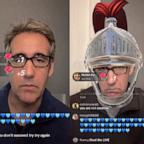10 Baffling Medical Conditions
These 10 medical mysteries continue to leave doctors mostly stumped.
Dec. 3, 2008 — -- Persistent sexual arousal syndrome. An allergy to cold temperatures. Music-induced seizures.
They are conditions that you may be hard-pressed to find in the medical literature. Bring them up in front of a physician, and in some cases you may get little more than a blank stare.
But they exist. And while such rare conditions are cocktail-party fodder for some, they can be a source of difficulty and shame for those who experience them firsthand.
The following pages feature some of the more unusual medical conditions that have received recent media attention.
Natalie Adler, 21, of Caulfield South, Melbourne, Australia, says she can sense the onset of her unusual condition -- and when she should start preparing for three days of darkness.
"The night before it sets in, my eyes get quite heavy and that is how I know it is coming," Adler told ABCNews.com.
Invariably, the next morning Adler finds herself unable to open her tightly shut eyes. The bouts generally last for about three days, after which she can open her eyes and once again see normally.
Adler said she has suffered from the condition for the last four years. Doctors, both in Australia and the United States, are baffled as to the exact cause -- or indeed, whether her condition is physical or psychological.
"We're not really sure of the diagnosis," said Catherine Mancuso, an orthoptist who coordinated Adler's treatment plans at The Royal Victorian Eye and Ear Hospital in Melbourne, Australia.
"There's nothing that would cause symptoms of a woman to close her eyes for three days, and open her eyes for three days," said Dr. Dean Cestari, a neuro-ophthalmologist at the Massachusetts Eye and Ear Infirmary in Boston.
Cestari believes that at least part of Adler's condition may be attributed to a psychological condition that has manifested itself in a physical way.
"It can be hard, because sometimes these patients come in with real experiences. They aren't making this up," said Cestari. "But the mind converted a conflict into a physical manifestation."
For now, Adler receives Botox treatments to the muscles surrounding her eyes. The injections often help her to keep her eyes open, but she said that the effectiveness of the treatments is starting to wane.
Now she is holding out hope for a more permanent solution, as well as a way to continue her day-to-day life despite the condition.
"In the beginning, I tried to ignore it but have now learnt to live with it," she said.
"I thought I was alone in this," Heather Dearmon, a 34-year-old South Carolina woman who experiences PSAS, told ABC News' "Primetime." "And this is after seeing every kind of doctor imaginable -- gynecologist, psychologist, psychiatrist — you know, everything. And none had ever heard of anything."
Relief from the condition is often as elusive as sympathy. The sensations, which are not brought about by fantasies or other sexual thoughts, are often only partially relieved through orgasm. For some women, even sex does not help quell their arousal, and on occasion can even make the sensations worse.
Dr. Irwin Goldstein, a professor of surgery at U.C. San Diego and the head of the Sexual Health Program at Alvarado Hospital, studies the condition. And he says understanding of the condition is spare, even within the medical community.
"Every lecture I give on this, there's always smirks in the audience: 'oh I wish my wife was like this.' These are professional physicians," Goldstein said. "And I said, 'no, no, you're, you don't really want this. You do not want your wife to have this, please.'"
Indeed, the mortifying nature of PSAS leads Goldstein to believe that perhaps thousands of women suffer from the condition without seeking a doctor's help.
"To me this is a sickness," Dearmon said. "This is not, it's not something we've chosen. ... I would rather never have another orgasm in my life for the rest of my life than to have this problem."
In January 1999 he traveled 100 miles north of the Arctic Circle to run a half marathon in his bare feet. Three years later, dressed only in a swimsuit, he dived under the ice at the North Pole and earned a Guinness world record for the longest amount of time swimming under the ice: 80 meters, almost twice the length of an Olympic-size pool.
Hof earned more recent renown for scaling Mount Everest in his shorts.
Hof told ABC News' "20/20" that his ability to withstand cold temperatures was something he discovered more than two decades ago.
"I had a stroll like this in the park with somebody, and I saw the ice and I thought, 'what would happen if I go in there?' I was really attracted to it. I went in, got rid of my clothes. Thirty seconds I was in," Hof said. "Tremendous good feeling when I came out, and since then, I repeated it every day."
Dr. Ken Kamler, author of "Surviving the Extremes," has treated dozens of people who tried to climb Mount Everest, and instead nearly died from the frigid temperatures. When he heard that Hof had ascended the mountain wearing shorts, he became intrigued and began to study the Dutchman. He believes that Hof's ability lies in the wiring of his brain.
"It's very easy to speculate that the same mind control that you use to control your heart when you're scared also can be called upon to control the other organs in the body. And maybe that's how Wim Hof does this," said Kamler. "That's… it's speculation, but it sort of makes sense, and a lot of scientists are working very hard to try to figure this out now."
Worse, those with the condition can expect to experience similar reactions to bitter winds and cold surfaces. A minor exposure, such as taking a few snowflakes to the face during a blizzard, can result in the formation of itchy, uncomfortable bumps. A major exposure -- such as from diving into a chilly swimming pool -- could theoretically be enough to send the body into a potentially deadly allergic shock.
"There are patients that we've been talking to who have had full-blown vascular collapse and ended up in the emergency room, at death's door," said Dr. Gerald Gleich of the University of Utah, who studies patients who suffer from cold urticaria. "This is a very, very potentially serious problem."
Gleich said that as with other allergies, the hives that occur in those with the condition are brought about by an inappropriate immune response. Specifically, an antibody known as immunoglobulin E is likely to blame, as Gleich's studies have revealed that it is this component of the immune system that is activated when these patients encounter a cold stimulus.
Fortunately, this feature of the condition may also point to possibilities for treatment.
"Many of these patients are taking antihistamines, and some are getting good relief," he said. "We would like to see whether antibodies to immunoglobulin E would block all symptoms in these people. If it does, the FDA [Food and Drug Administration] might be willing to approve it and then we would have a treatment."
"We went to the doctor after he was born, and I kept telling him something was wrong. He didn't sleep," Rhett's mother, Shannon Lamb, told ABC News' "Good Morning America."
"They thought I was being kind of an anxious mom, and we went back and forth," she said. "Finally, they [were] starting to realize now that he really doesn't sleep at all. But we've had a lot of different diagnoses and nobody really knows."
After a number of conflicting opinions, Rhett's parents finally learned what was wrong with their child: Doctors diagnosed Rhett with an extremely rare condition called chiari malformation.
"The brain literally is squeezed into the spinal column. What happens is you get compression, squeezing, strangulating of the brain stem, which has all the vital functions that control sleep, speech, our cranial nerves, our circulatory system, even our breathing system," said ABC News medical consultant Dr. Marie Savard.
In order to relieve this pressure, doctors earlier this year performed a surgery that would afford more space in the boy's skull for his brain. Surgeons made an incision at the base of Rhett's skull to the top of his neck and removed the bone around the brain stem and spinal cord.
Doctors expected results of the surgery, conducted in May, to take up to a year to manifest.
"There is a 50-50 chance that the sleep will improve," Lamb said. "Once the sleep improves, we can work on the behavioral stuff. He's very irritable all of the time."
"I would love to see him play and have a good time and be happy," she said.
For others with similar sleep-deprivation conditions, a lack of sleep can have serious detrimental health effects. Several studies since 2001 have linked a lack of sleep to heart disease and various mental disorders.
Wisconsin resident Brad Williams is one of these people. His extensive memory allows him to recall almost any news event and anything he has experienced, including specific dates and even the weather.
"I was sort of a human Google for my family," the 52-year-old told "Good Morning America" in his first television interview earlier this year. "I've always been able to recall things."
Another case is a woman who is simply known as "AJ" who revealed her condition to University of California at Irvine brain researcher James McGaugh, one of the world's leading experts on how the human memory system works.
Like Williams, AJ can answer obscure questions with mind-blowing accuracy -- such as the weather on a particular day several years in the past, or the details of a decades-old news item.
The condition is known among brain researchers as hyperthymesic syndrome, based on the Greek word thymesis for "remembering" and hyper, meaning "more than normal."
McGaugh told ABC News' Lee Dye that while the brains of these people are able to perform amazing feats of recall, it is still not fully understood exactly how this occurs. One hypothesis is that the "wiring" of the brains of those with hyperthymesia is set up in such a way that their brains are better able to organize and categorize information for later access.
Past this, however, researchers are stumped.
"In order to explain a phenomenon you have to first understand the phenomenon," McGaugh said. "We're at the beginning."
Details of Propst's case continue to baffle doctors. What they do know is that a devastating "electrical storm" in her brain caused her declarative memory to be wiped clean. Facts, events, dates, acquaintances and even her identity were wiped away. As Propst describes it, "If I was a computer, it would be like my hard drive was erased."
David Ewing of Centennial Neurology in Greeley, Colo., Propst's doctor, said that it is remarkable that Propst has adjusted so well to her new life, which, in a way, began slightly more than 10 years ago. The seizure, he says, effectively disconnected the area of her brain in which her memories were stored.
"The area is still there, still intact," he said. "But it was like someone threw a breaker switch. ... She had a single general event, after which she woke up and all of her memories were wiped out."
Since the event, however, Propst has rebuilt her life. Her persistence in rejoining the work force has led to stable employment as a custodian at a state facility. She enjoys strong relationships with her family. And she has written a book, titled "Absent Memories: Moving Forward When You Can't Look Back," which documents her experiences.
"Every single person I met said, 'You need to write a book about this,'" Propst said. "I thought, 'what the heck, what do I have to lose?'"
While Propst's experience is rare, there have been numerous documented cases in which an injury has led to long-term amnesia.
"[There was a] nurse that was from Newfoundland," Dore told ABC News. "She comes down the hall, and she come into the room and she says, 'who's the Newfie here?'" referring to Newfoundland.
"I said, 'There's nobody here like that.'"
"And she said, 'I think I'm talking to her.'"
Though rare, foreign accent syndrome is not entirely undocumented in medical literature. Researchers who have studied the syndrome estimate there are only as many as 60 legitimate recorded cases.
One of the first known patients was reported after World War II by Norwegian neurologist Georg Herman Monrad-Krohn. He described a Norwegian woman who was hit on the head by a bomb fragment during the war and began to speak with a German-like accent. Because of her speech, she became the target of anti-German sentiment.
More recent cases include a Florida woman speaking with a British accent, a Japanese woman sounding to other Japanese as if she were Korean and a South Carolina man developing a French-like accent.
"I have only seen a couple of people with [foreign accent syndrome] ... and I've seen a lot of stroke patients in my time," said Dr. Julius Fridriksson, an associate professor of neuroscience at the University of South Carolina who worked with the South Carolina patient. "These folks have brain damage that alters the way the neurological system works."
"It was terrible," Gayle, a 24-year-old New Yorker, told ABCNews.com. "It didn't even have to be that loud."
One of Gayle's first music-induced seizures happened at a cookout where the song "Temperature" was being played. Some time after this, she had a similar experience at a restaurant.
The seizures were so bad that Gayle finally had part of her brain surgically removed in an effort to control her problem.
"She realized her life was going out of control with these seizures happening," said Dr. Ashesh Mehta, the director of epilepsy surgery at Long Island Jewish Medical Center.
Mehta recalled meeting Gayle in February to discuss her condition. When Gayle's mother played '"Temperature" on an MP3 player for her daughter to hear, a music-induced seizure followed.
"It was amazing to me," said Mehta. "We got a seizure when we put her music on."
Brain researchers believe such seizures can occur when the part of the brain that processes emotions associated with a certain type of music overlap with areas of the brain that trigger seizures.
About 70 percent of people with epilepsy are able to control their seizures through medication. For those who still have seizures or cannot handle the side effects of the medication, doctors consider brain surgery.
"We did try a number of different anti-seizure medications, but it was clear that her epilepsy was not responding," said Dr. Alan Ettinger, chief of the epilepsy center at Long Island Jewish Medical Center. "In her case, in addition to music setting off the epilepsy, even the very thought of the song started to provoke the seizures."
"I was massaging Gabby's gums one day, and she bit down on me ungodly hard. It was so hard, I couldn't stand it," Gabby's father, Steve Gingras, told ABC News' Primetime. "When I pulled my finger out, I pulled a tooth out of her mouth -- and she's just happy playing like nothing happened."
Gabby's lack of pain sensation eventually led to the loss of all of her teeth. A badly scratched cornea forced doctors to remove her left eye, and she now wears a helmet and goggles every day to protect herself from serious injury.
In Gabby's case, the condition arose from a genetic accident that stunted the development of nerve fibers crucial in the detection of pain and temperature.
As children with this condition get older, the hazards associated with never knowing the sensation of pain persist. However, a number of people have lived into adulthood with the condition.
Gabby's parents have started a foundation called Gift of Pain, a support group for people with HSAN. So far they have found 39 people who think they have the condition.
"I don't want another mother to ever sit where Steve and I sat five or six years ago and say, 'what is going on? Why can't I get help? Why can't I get information?'" Trish Gingras, Gabby's mother, told "Primetime." "That's really what motivates me."




